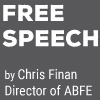Hope for the New Year
“Free Speech” is a monthly column by Chris Finan, director of the American Booksellers for Free Expression (ABFE), that shares his personal thoughts and opinions on a broad range of free expression issues; the views expressed do not necessarily reflect those of the American Booksellers Association. Finan welcomes comments and suggestions at [email protected].

People are predicting that free speech will take it on the chin in 2017.
It is a reasonable assumption. For one thing, President-elect Donald Trump has said both that he wants to change libel laws to make it easier to silence authors and members of the press and that he would like to prosecute protesters who deface the American flag.
It is possible we will also see something similar to what happened following the election of Ronald Reagan in 1980, when the number of book challenges in schools and libraries rose so sharply that Banned Books Week was launched to draw attention to the problem.
Booksellers were on the defensive throughout the 1980s as pro-censorship groups took advantage of the new political climate. Indianapolis even passed an ordinance drafted by two anti-pornography feminists that allowed the victims of sexual assault to sue bookstores for selling sexually explicit material that “caused” the crimes, including books and magazines with serious literary and artistic value. (The law was declared unconstitutional.)
But government censorship is not the only threat to free speech. There also appears to be a growing intolerance of opposing views on both sides of the ideological divide.
We saw this in the violence that some Trump supporters used against protesters at campaign rallies and in the hostility directed at reporters covering Trump events. On the other side, activists have been demanding that publishers withdraw books that they consider racist.
Last January, Scholastic stopped selling A Birthday Cake for George Washington in response to criticism that the book contained images of “happy” slaves. “It’s great this book will no longer be available,” one of the critics wrote. “This book should never have made it to print. Period. This is not self-censorship, this is CORRECTION.”
In August, Candlewick announced that it was postponing the publication of When We Was Fierce because it had been criticized for negative portrayals of African Americans. It remains unpublished.
Last month Abrams agreed to an author’s request not to print additional copies of Bad Little Children’s Books, an adult humor book satirizing the sunny images that used to appear on the covers of Little Golden Books and other children’s titles. Two of the 120 images in the book were condemned as racist, including one titled “Happy Burkaday, Timmy!” which portrays a young girl in an Islamic headdress giving Timmy a gift containing a ticking bomb.
One critic, Kelly Jensen, condemned the image in a blog post. “I find dark humor to be wildly enjoyable,” Jensen wrote. “But there comes a time when ‘funny’ becomes straight up hate and when that hate becomes straight-up racist....This kind of ‘humor’ is never acceptable. It’s deadly.... [I]t is the kind of garbage that needs to be eliminated at all levels, particularly publishing.”
The latest effort to suppress a book occurred this week when Simon & Schuster was threatened with a boycott by people who are unhappy about the publication of a forthcoming title by Milo Yiannopoulos, a self-described “supervillain” and right-wing provocateur.
Ideological polarization will not end anytime soon. We have already seen a disturbing increase in hate speech and harassment of immigrants and other minorities, which has caused individuals and groups to speak up in their defense. In the coming months, I believe we will hear more people calling for limits on speech they oppose.
But we have faced dark times before. It was during such a period that Supreme Court Justice Oliver Wendell Holmes wrote the dissenting opinion that became the foundation of First Amendment jurisprudence. The government had savagely suppressed free speech during World War I, censoring anti-war newspapers and sending more than one thousand people to jail for criticizing the government.
Holmes himself had supported the repression, but he changed his mind in the months following the end of the war, when the country was gripped by fear of Communism. He had become convinced that the only safety for a democratic society lay in “a free trade in ideas.” As he wrote in Abrams v. United States in 1919, “The best test of truth is the power of thought to get itself accepted in the competition of the market.”
The corollary was clear. We must be willing to tolerate ideas that we totally reject. “I think that we should be eternally vigilant against attempts to check the expression of opinions that we loathe and believe to be fraught with death,” Holmes said.
It is because booksellers are strongly committed to tolerance and free speech that I believe that we can help moderate the tensions in our society.
Bookstores have always played an important role in helping their communities deal with calamity. It happened in the aftermath of the 9/11 attacks, when bookstores provided a venue for critics of national security policies that threatened civil liberties. After the Columbine school shootings, we developed and shared a reading list about the causes of violence. Following the Orlando nightclub massacre, booksellers suggested hundred of titles for a new list to broaden understanding of the challenges and discrimination faced by the LGBTQ community.
Several bookstores have recently encouraged debate on the issues of race and diversity. In 2014, Left Bank Books, in St. Louis, created a book group, #FergusonReads, in response to the shooting of Michael Brown Jr., in nearby Ferguson. The following year, two North Carolina bookstores, Quail Ridge Books & Music in Raleigh and the Regulator Bookshop in Durham, sponsored moderated discussions on issues related to race and diversity, which drew large audiences.
In the wake of the presidential election, ABA CEO Oren Teicher issued a statement urging booksellers to join in healing the nation’s divisions. “All of us in the bookselling community have a special obligation — and opportunity — to foster communication and to help reconcile our communities,” he wrote.
American Booksellers for Free Expression (ABFE) is committed to helping booksellers during this period of intense ideological conflict. We will continue to fight censorship, as we did when officials in Saugerties, New York, recently attempted to force the Inquiring Minds Bookstore to remove an anti-Trump banner from its front window.
We will also help booksellers who want to follow the example of Left Bank, Quail Ridge, and the Regulator in addressing current events. ABFE and booksellers are working on compiling a list that will provide suggestions for books exploring race, immigration, and other issues that divide us.
Some stores will also want to make an effort to bring together community members with a wide range of political views to engage in constructive dialogue. For them, we will ensure that the reading list contains titles that represent a diversity of perspectives. We will also offer advice on programming and help find moderators who will ensure that debate is civil.
There is no better medium for encouraging the free trade in ideas than books. They allow us to move beyond the heated emotion and inflamed rhetoric of campaigns to think hard about our problems. They provide common ground for debating the issues.
In dark times, bookstores offer hope.


